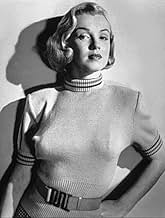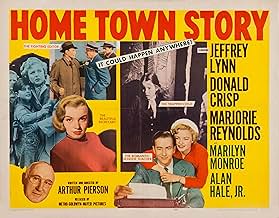Home Town Story
- 1951
- Tous publics
- 1h 1min
Ajouter une intrigue dans votre langueAfter failing to be re-elected, politician Blake Washburn returns home and becomes editor of the local newspaper. When he notices the influence the paper has on the public, he uses it to app... Tout lireAfter failing to be re-elected, politician Blake Washburn returns home and becomes editor of the local newspaper. When he notices the influence the paper has on the public, he uses it to appeal to potential voters in the next election.After failing to be re-elected, politician Blake Washburn returns home and becomes editor of the local newspaper. When he notices the influence the paper has on the public, he uses it to appeal to potential voters in the next election.
- Réalisation
- Scénario
- Casting principal
- Katie Washburn
- (as Melinda Plowman)
- Hospital Nurse
- (non crédité)
- Jimmy
- (non crédité)
- Don
- (non crédité)
Avis à la une
The supporting cast almost makes it worth seeing by itself. How often do you see the combination of Marilyn Monroe, Donald Crisp, and Alan Hale, Jr. in the same movie? Monroe appears in several scenes, and although only one gives her any significant screen time, she does get the chance to command some attention. Hale is well-cast as the good-natured sidekick. Crisp's talent and experience keeps the last portion of the movie from coming apart. The lively Marjorie Reynolds is also in the cast, but her character doesn't give her many opportunities to show what she can do.
The story line was overtly designed to accommodate the corporate backers of the movie, and now it is really only of interest as a look at some common perceptions of its day. The last part of the movie did have the potential for some fairly effective melodrama, but parts of it become rather labored, and it is mainly thanks to Crisp's restrained performance that it remains watchable.
Jeffery Lynn is cast as the leading character, and while he has his moments, he does not really have the range to make a routine story like this work effectively. He does not make his character very likable or interesting, and as a result his character's perspective is largely trivialized. That plus the rather routine script make it a largely unmemorable movie, aside from the curiosity factor that it offers.
The movie starred Jeffrey Lynn as Blake Washburn - a one term state senator who's defeated for re-election and can't let it go. In fact he's the poster boy for sore losers, ready to pick fights with anybody who brings his defeat up, and convinced that the people were tricked into voting for his opponent. Frankly, he was a thoroughly unlikable character. Returning to his hometown, he uses his new position as editor of the family-run newspaper to criticize the man who beat him and to take on a variety of crusades, most notably against excess corporate profits. In that sense, the movie perhaps had some potential to provide a degree of social analysis, except that there was always question as to whether Washburn really cared about these issues, or whether he was simply using the paper as a platform to launch another election bid. In the end, the movie actually becomes a celebration of the system, as Washburn learns why profits are necessary, and how a company's profits benefit us all.
I found this most interesting for the very early look at Monroe, as well as for a look at a not bad piece of work from a young Alan Hale, Jr., who I know best as the Skipper from "Gilligan's Island." One thing really made me curious - how could Lynn play the brother of young Katie, played by Melinda Plowman, who got a few years as a bit player out of an acting career? Lynn would have been 42 when this was made, Plowman about 10. The family relationship was not at all believable. 4/10
"Hometown Story" has to do with defeated local state senator Blake Washburn, Jeffrey Lynn, who's so embittered over his being turned out of office that after going back to his old job as editor of the Fairfax Herald decides to become a crusader against corporate corruption. Which in reality is attacking his opponents the new state senator McFarland, who defeated him, fathers business.
A angry young man with a chip on his shoulder Blake gets so involved in his anti-capitalistic crusade against old man John McFarland, Donald Crisp, over his sons defeat of him in the state elections that he completely overlooks the fact that the plant that he owns is the cleanest most environment-friendly and best run in the state. This make a now frustrated Blake turns his guns, or editorial, against every big business in the country who makes a profit regardless if it's done honestly or not! Trying on Blake's part to create a peoples revolution against big business/capitalism. This mindless action by Blake in 1951, at the hight of the Cold War, could well have had him both arrested and tried by the FBI and US Justice Department for treason!
Blake even though a likable guy is so obsessed with getting re-elected that he turns everyone who knows him like his fiancée Janice and best fiend reporter Slim Haskins, Marjorie Reynolds & Alan Hale Jr, against him. This leads Slim to almost end up almost punching him out in a confrontation he has with Balke in his office.
It takes a conversation that Blake has with John McFarland to fills the hot-headed editor in with what capitalism did in making America the great country that it is today. Later the near tragic accident that almost killed Blake's sister Kathy, Melinda Portman, and McFarland rescue of her that turned him in his negative ideas of capitalism around. Kathy trapped in a coal mine collapse, together with her new puppy Rags, painfully showed Blake the light as the forces of capitalism and the free market quickly and efficiently swung into action.
Old man, and business tycoon, McFarland using all the earth moving equipment that he had at his disposal ended up saving little Kathy's and her dogs life. In the end Blake now finally saw what capitalism had to offer the common working man and woman, and it was good. This all caused Blake to changed his mind as he became the biggest supporter of the capitalist system in the state. Rewriting and reediting all the bad things and press that ever said or wrote about big business making big bucks Blake now sees how important the benefits of capitalism is for the average working man and woman as well. Now with Blakes support all those big bucks will in the end help those, like his sister Kathy, who at first didn't seem to get, or benefit from, them. A bit condescending for my tastes in how great it is for corporations to make obscene profits which, we could only hope, in return helps all of us.
P.S Look for a young and scintillating Marilyn Monroe in the film in a bit part as sexy and unavailable, to at least the overly friendly Slim Haskins, Iris Martin. Iris' tight fitting sweaters are enough to make me want to get a job at the Fairfax Herald regardless of what I'll be paid in wages just so I can even get lucky enough to buy Marilyn a cup of coffee and have a chance to talk to her.
This unreleased GM inhouse movie was on TV as a late night movie recently (probably because it had two minutes of yet-to-be-a-star Marilyn Monroe in it), it was so awful I had to find out who wrote, directed and produced it. As I said, it was produced by GM - the writer and director was Arthur Pierson. Four years later Pierson would direct "Born In Freedom: The Story of Colonel Drake", a 30 minute movie about the beginning of the oil industry. I had read how US corporations produced a lot of these propaganda films (as well as books etc.) in the 1950's and tried to get them out there before they came upon more subtle and persuasive techniques and not this hard, bang-you-over-the-head with Soviet-style shoddy propaganda. If anything, this movie is an artifact of that happening, and perhaps interesting in that respect.
Le saviez-vous
- AnecdotesMarilyn Monroe was often expected to provide her own wardrobe, a common practice in Hollywood at the time. The sweater with the grey body and black sleeves that she wears worn previously in Le Roi de la piste (1950) and in the final scene in Ève... (1950).
- GaffesWhen Blake arrives home, his mother is listening to a radio show that states it is a Saturday afternoon program, but the next morning (which should be Sunday) Katie gets on a bus to go to school.
- Citations
Iris Martin: I always treat men with respect so they do the same to me.
Slim Haskins: Let me know when that works!
- ConnexionsFeatured in Vampira and Me (2012)
Meilleurs choix
- How long is Home Town Story?Alimenté par Alexa
Détails
- Date de sortie
- Pays d’origine
- Langue
- Aussi connu sous le nom de
- Hometown Story
- Lieux de tournage
- Sociétés de production
- Voir plus de crédits d'entreprise sur IMDbPro
- Durée1 heure 1 minute
- Couleur
- Rapport de forme
- 1.37 : 1
Contribuer à cette page




































